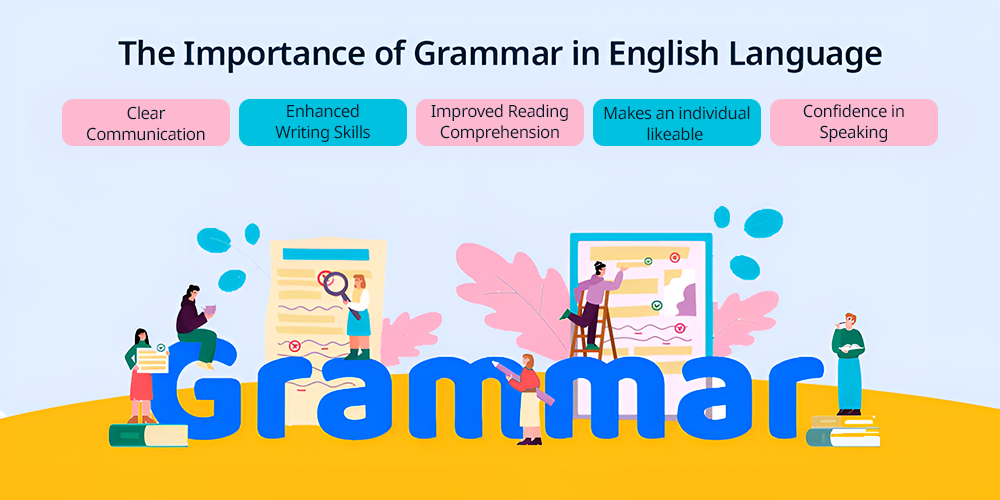
Grammar is the building block of the English language. It helps in smooth, clear, and effective communication.
Moreover, English is the central language for cross-border communication and a pivotal part of the curriculum and hence proper grammar is essential for it.
Read more on the importance of communication skills here.
With several key pointers stressing on the importance of grammar, it becomes essential for accurate language use and expressing English confidently.
Read on to understand more on the importance of grammar in the English language in this write-up.
Starting with what is English grammar, you’ll find the main grammar rules to follow while mastering the English language.
Contents
What is English Grammar?
English Grammar refers to the system of the English language, having a set of rules which helps to structure a sentence. It lays a structural foundation for the language to be expressed and received as it is intended to be understood.
When it comes to putting our thoughts into sentences that can be perceived perfectly, the knowledge of grammar becomes invaluable. You may have seen or met many people struggling to communicate in foreign languages which is due to poor grammatical skills.
English being a global language has to be learnt with proper knowledge of grammar so that you can confidently express yourself anywhere in the world.
Read on to learn more about importance of english language: why it matters and how to improve.
The Importance Of Grammar in the English Language
English speakers can possess the means to express themselves both in writing and verbally with the right use of grammar.
The right application of grammar is vital to learning, working, and simply living amongst other people.
The key pointers highlighting the importance of grammar in the English language are:
1. Clear Communication
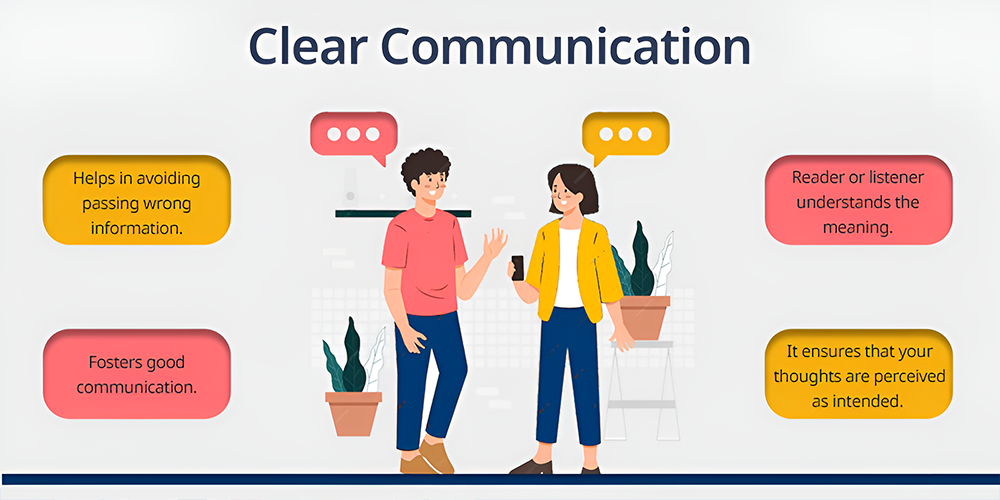
Good grammar also helps the sender of the messages avoid passing any wrong information to the receiver and foster good communication. If the constructions of the sentences are correct, the reader or listener understands the meaning that was passed in the notice.
On the other hand, incorrect grammar results in misunderstanding or the creation of the wrong impression. Having a proper knowledge of Grammar ensures that your thoughts are perceived as intended.
For example: “I want to go”, gives a correct impression of your will to go somewhere whereas “I go” doesn’t express the same feeling.
Read The Importance Of Skill Development in School Education and understand the necessity of having clear communication.
After the communication, the next important aspect of grammar is its role in exemplary writing.
2. Enhanced Writing Skills

Among all the manifestations of grammar, the most evident is that writing is impossible without its help. Any writer who has a good feel of the grammar policies in language usage is in a position to write good, flowing, and appealing text.
Grammar helps writers to organise ideas whether they are writing an essay, an email, or a report, and to express them in the right order.
Children must avoid making grammatical mistakes because they affect the readers’ attention and obscure the content of the message.
With good use of grammar in writing, your overall English language comprehension is increased.
3. Improved Reading Comprehension
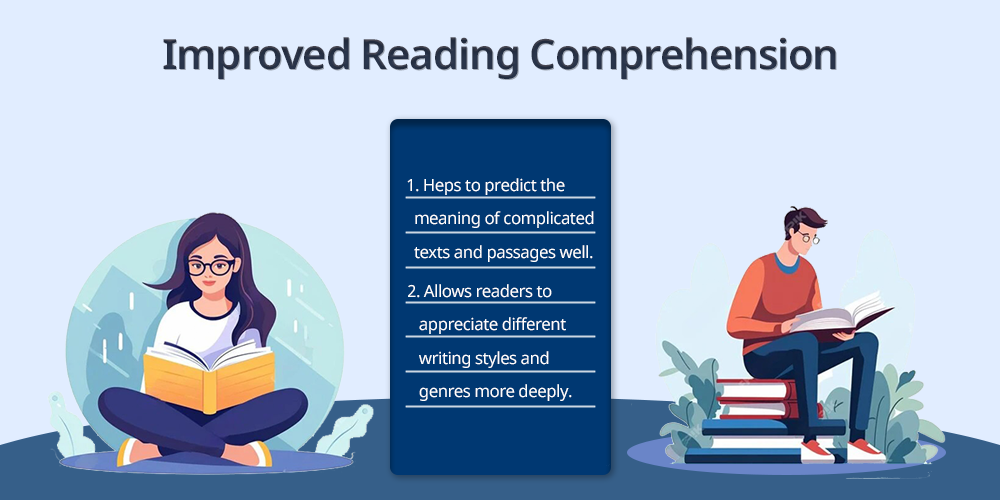
Grammar not only helps in the process of writing but also plays a crucial role in reading comprehension.
Each reader who comprehends the grammar of texts would consequently predict the meaning of complicated texts and passages well.
Solutions in communication consist of such elements as punctuation, construction, and order of the composition to contribute to the understanding of relationships between ideas.
Additionally, improved grammar knowledge allows readers to appreciate different writing styles and genres more deeply.
Your English grammar skills further makes you likeable in many areas.
Check out from here to understand the key benefits of learning english language and why it’s essential for success.
4. Makes an individual likeable

Good grammar will make an individual more likeable in English communication.
Those who speak and write correctly with grammar tend to be perceived as more educated, more credible, and detail-oriented.
For individuals in the social and professional realms, grammar is highly useful. Perception of a person can be done based on how clear and correct the language a person uses in communication.
Making grammatical mistakes often may cause people to doubt a person’s competency or just plain carelessness when doing a formal job.
Have you ever felt that you’re confident in speaking with good knowledge of English grammar?
5. Confidence in Speaking

Speaking comes along with confidence when you have the right balance of grammar.
Correct grammar helps people to speak and write confidently, and fit in social, academic, or business settings successfully.
When someone speaks with correct grammar, their speech flows better, and they are less likely to hesitate or feel unsure about their language.
This level of confidence can lead to increased opportunities to interact, make presentations, and work in leadership positions where communication is essential.
Check out the 21K School Skill-based Program to know how much they value skills based knowledge.
With a quick list of top important pointers for grammar’s importance in English, you must go through the different grammar rules.
Here you can check the creative English activities for kids, which help to improve their fluency.
Key Grammar Rules to Master
Here are the general rules that every learner needs to undertake:
1. Tense

Tenses are very important as with their help, one may indicate the time of the action. They show whether an event was in the past, now, or will be in the future.
English has three main tenses—past, present, and future and is subdivided into simple, continuous, perfect, and perfect continuous tenses.
With good information on tenses, you can confidently move to learn the use of subject-verb agreement.
2. Subject-Verb Agreement:

Subject-verb agreement is a fundamental rule in English grammar. It means that the subject of a sentence must match the verb in number (singular or plural).
For example, “The dog barks” (singular) and “The dogs bark” (plural) follow this rule. Errors in subject-verb agreement can make sentences sound awkward and disjointed, confusing the listener or reader.
The next important aspect of English grammar is proper punctuation for enhanced understanding.
3. Punctuation

It is clear and understandable that punctuation marks are invisible soldiers of grammar. They help structure sentences, indicate pauses, and clarify meanings.
This is true even to this very small detail such as the loose comma or the missing full stop.
For example, the example between “Let’s eat, John” and “Let’s eat John” shows how punctuation changes meaning.
Next, you must learn the prepositions in English grammar for smooth link between different words.
4. Prepositions
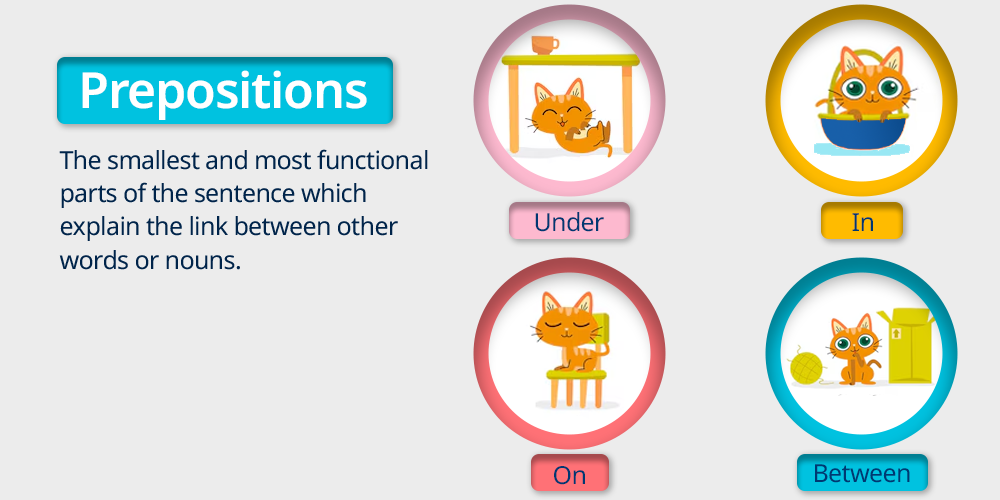
Prepositions are probably one of the smallest and most functional parts of the sentence which explain the link between other words or nouns.
They include words like ‘in’, ‘on’, ‘at’, and ‘between’ among others.” These words include location, time, direction, and more.
Another thing that makes prepositions challenging is that their use is largely idiomatic in English, in other words, meaning they don’t always follow predictable rules.
Another important aspect after prepositions in English grammar is smooth sentence structure.
5. Sentence Structure

Sentence structure refers to how words are arranged to create meaningful sentences.
In English, sentences typically follow a subject-verb-object pattern. For example, “The cat (subject) chased (verb) the mouse (object).”
With smooth sentence structure, you may wish to learn the use of the auxiliary verbs in English.
6. Modal Verbs
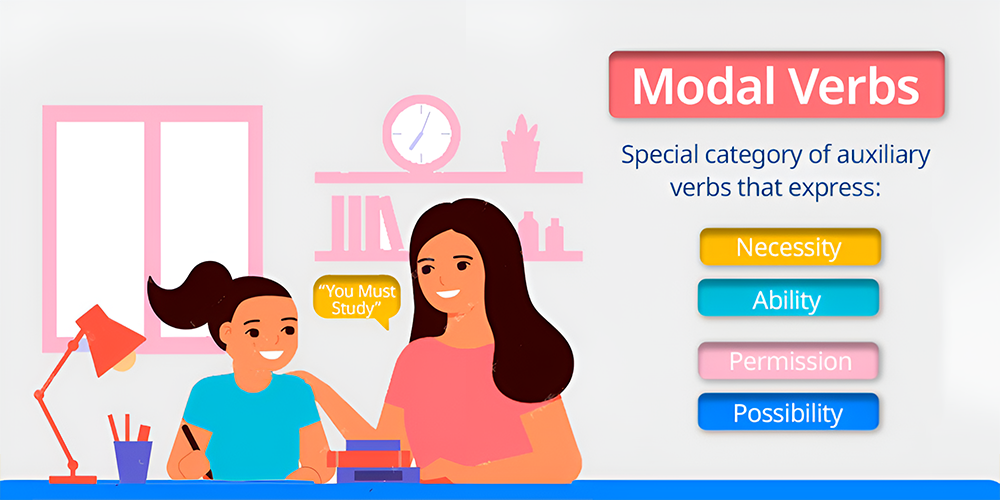
Modal verbs are a special category of auxiliary verbs that express necessity, ability, permission, or possibility.
Common modal verbs include “can,” “could,” “should,” “would,” “might,” and “must.”
For example: “I can swim” expresses ability, while “You must study” shows necessity.
Understanding the correct use of modal verbs is essential for making requests, giving advice, or stating possibilities, which enhances clarity in communication.
Here are 12 proven ways to improve spelling mistakes and strengthen your English writing skills
Conclusion
Grammar plays a pivotal role in the English language, guiding clear communication, enhancing writing, and improving reading comprehension. It even shapes how others perceive us.
Mastering key grammar rules like tense, subject-verb agreement, and punctuation can unlock a deeper understanding of the language and improve both written and spoken English.
Whether it’s for professional growth, personal development, or boosting confidence, investing time in learning grammar is an invaluable step toward becoming a more effective communicator.



